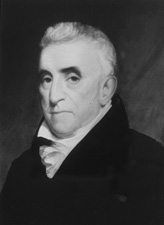
David Daggett was a U.S. senator, mayor of New Haven, Connecticut, Judge of the Connecticut Supreme Court of Errors, and a founder of the Yale Law School. He helped block plans for the first college for African Americans in the United States and presided over the conviction of a woman running a boarding school for African Americans in violation of Connecticut's recently passed Black Law. He judged African Americans not to be citizens and supported their colonization to Africa.
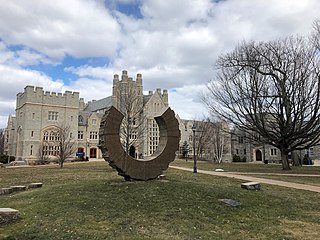
The University of Connecticut School of Law is the law school associated with the University of Connecticut and located in Hartford, Connecticut. It is the only public law school in Connecticut and one of only four in New England. As of 2020, it enrolled 488 students.

Quinnipiac University School of Law is the law school of Quinnipiac University located in North Haven, Connecticut. It is a member of the Association of American Law Schools, and is currently ranked tied at 143rd by U.S. News & World Report.

The Connecticut Supreme Court, formerly known as the Connecticut Supreme Court of Errors, is the highest court in the U.S. state of Connecticut. It consists of a Chief Justice and six Associate Justices. The seven justices sit in Hartford, across the street from the Connecticut State Capitol. The court generally holds eight sessions of two to three weeks per year, with one session each September through November and January through May. Justices are appointed by the governor and then approved by the Connecticut General Assembly.

Susan Bysiewicz is an American politician and attorney who has served as the 109th lieutenant governor of Connecticut since 2019. She previously served as the 72nd secretary of the state of Connecticut from 1999 to 2011 and a member of the Connecticut House of Representatives from 1993 to 1999.

The Connecticut Appellate Court is the court of first appeals for all cases arising from the Connecticut Superior Courts. Its creation in 1983 required Connecticut's voters and legislature to amend the state's constitution. The court heard its first cases on October 4, 1983. The Appellate Court was also a partial successor to the former Appellate Session of the Superior Court, a court established to hear appeals in minor matters

Joette Katz is an American attorney who is a partner at the law firm, Shipman & Goodwin LLP. She was an associate justice of the Connecticut Supreme Court, where she also served as the administrative judge for the state appellate system, and later was the Commissioner of the Connecticut Department of Children and Families. In various roles during her career she has had an impact on issues of state and national importance, such as: criminal law, capital punishment, civil rights and the right to education, eminent domain, same-sex marriage, LGBTQ rights, sexual assault, sex trafficking, and helping children in state care move from institutions to families.
Ellen Ash Peters was an American lawyer and judge. She was appointed to the Connecticut Supreme Court in 1978. She was the first woman appointed to that court.

Vanessa Lynne Bryant is a senior United States district judge of the United States District Court for the District of Connecticut.

Ellen Lucille Bree Burns was a United States district judge of the United States District Court for the District of Connecticut.
John R. Thim was a Connecticut lawyer and politician who served as Speaker of the Connecticut House of Representatives in 1949, and as a justice of the Connecticut Supreme Court from 1966 to 1972.
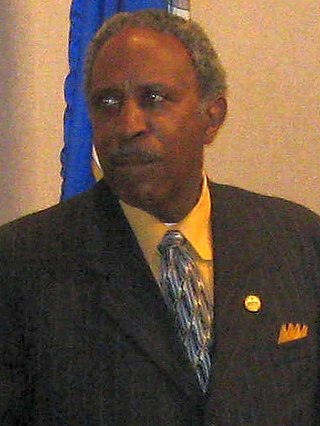
Lubbie Harper Jr. is an American lawyer and judge who was the third African American to become a justice of the Connecticut Supreme Court, serving from 2011 through 2012. While seconded to the court in 2008, he cast the deciding vote in Kerrigan v. Commissioner of Public Health, a ruling that legalized same-sex marriage in Connecticut. Harper also served as a justice on the Connecticut Superior Court (1997–2005) and on the Connecticut Appellate Court (2005–2011).
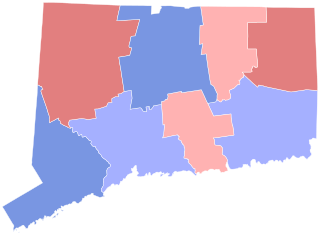
The 2018 Connecticut gubernatorial election took place on November 6, 2018, to elect the next governor and lieutenant governor of Connecticut, concurrently with the election of Connecticut's Class I U.S. Senate seat, as well as other elections to the United States Senate in other states, elections to the United States House of Representatives, and various state and local elections. This race's Democratic margin of victory was the closest to the national average of 3.1 points.

Maria Araújo Kahn is an Angolan-born American lawyer who is serving as a United States circuit judge of the United States Court of Appeals for the Second Circuit. She previously served as an associate justice of the Connecticut Supreme Court from 2017 to 2023.
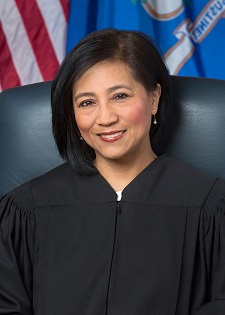
Nina F. Elgo is an American lawyer who serves as a judge of the Connecticut Appellate Court. She is the first Asian Pacific American to be appointed to the Connecticut Appellate Court and the Connecticut Superior Court.
Howard Thomas Owens Jr. was an American politician, lawyer and judge.
Norm Pattis is an American defense lawyer and former columnist who runs a law firm in New Haven, Connecticut. He is known for defending controversial clientele, including radio show host and conspiracy theorist Alex Jones, January 6 rioters Joe Biggs and Zachary Rehl, and the (alleged) murderer of Jennifer Dulos, Fotis Dulos. In 2023, Pattis' law license was suspended for six months in Connecticut in relation to a violation of a court order in the Alex Jones case, but the suspension was overturned in 2024.














